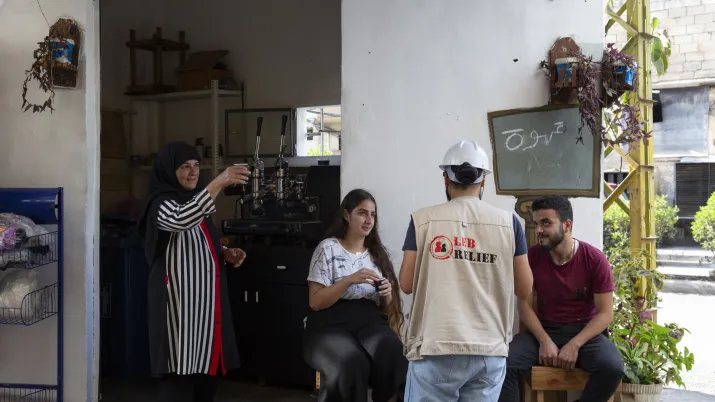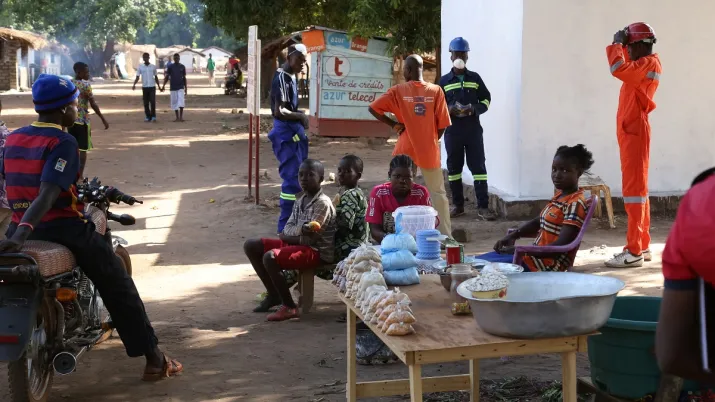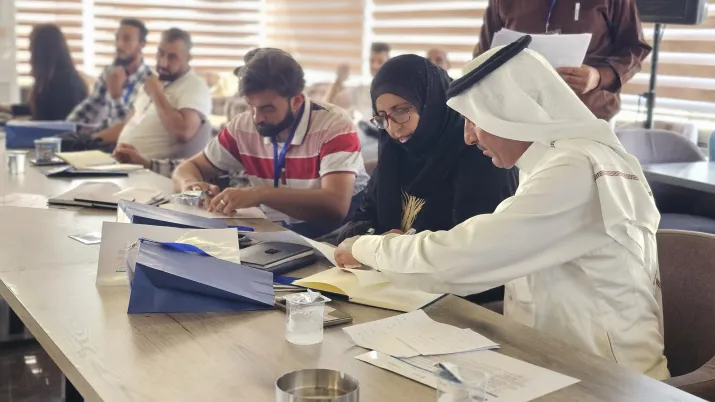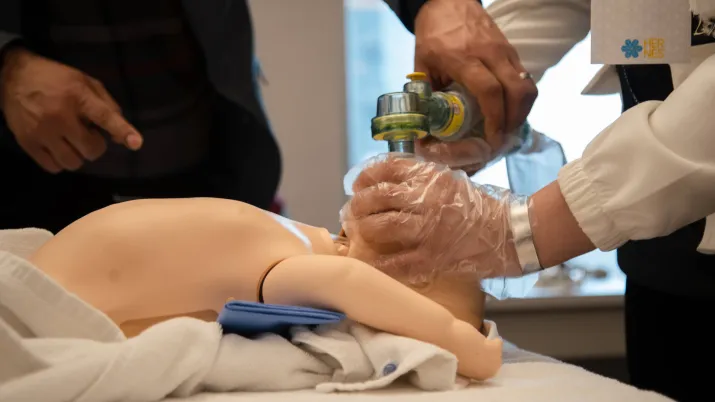Share the page
SABIR – Project to support the resilience of communities in north-east Syria
Project
Published on
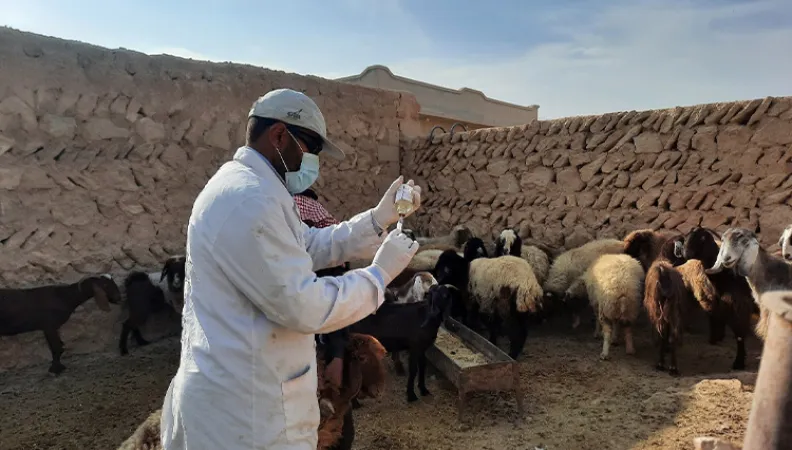
-
Project start date
-
Status
Ongoing
-
Project end date
-
-
Financing amount (Euro)
-
11m
-
Country and region
-
Syria, Middle East
This project aims to contribute to the stabilisation of north-east Syria by fostering local recovery and improved living conditions for the most vulnerable communities.
Between 2013 and 2017, a large part of the north-east region of Syria was under the yoke of the Islamic State, before gradually returning under the control of the Syrian Democratic Forces. The war against Daesh has caused massive destruction, which has considerably weakened economic activity and access to essential services.
According to the United Nations, 12.1 million people are food insecure in Syria and about 5.5 million people need direct food aid. Climate change, unpredictable weather conditions and regional political tensions also put considerable pressure on access to water in the region and on agriculture.
SABIR: contributing to the stabilisation of north-east Syria
It is this context that Expertise France launched the SABIR project in 2020. Its objective is to address these needs and contribute to the stabilisation of north-east Syria by fostering local recovery and improved living conditions for the most vulnerable communities in the region. The project is financed by the Crisis and Support Centre of the Ministry for Europe and Foreign Affairs with €11 million. The fourth phase of the project starts in March 2024 and will reach completion in early 2026.
Expertise France has opted for an integrated territorial approach (ITA) for the implementation of this project, to ensure that the response is appropriate and effective.
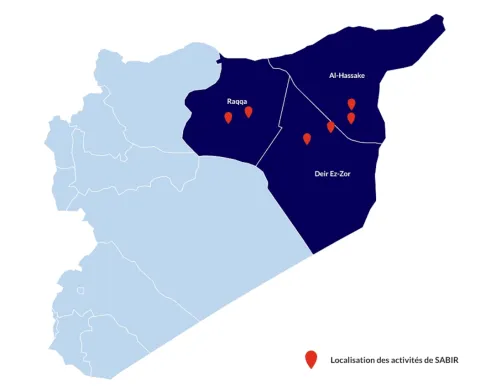
Integrated territorial approach
The integrated territorial approach involves providing multi-sectoral services in a defined area to better serve the needs of vulnerable communities. It is particularly relevant in situations with multi-sectoral needs and geographical disparity.
The SABIR project is thus supporting and assisting local committees, community organisations, and civil society organisations. Synergies between the activities and coordination between the local partners are encouraged to strengthen the impact and ownership of the project activities by the beneficiaries.
A multi-sectoral approach
The SABIR project comprises four complementary lines of action:
- Improve access to basic services
- Improve access to inclusive and sustainable livelihoods
- Strengthen social cohesion in areas where various communities coexist
- Build the capacities of local actors
In 2022, the project adopted a consultative community-based approach through the creation of community committees. The project’s activities were also relocated in the governorates of Raqqa and Al-Hasakah.
During the third phase (2023-2024), the community approach has been reinforced in the two target areas to better represent the community groups and their interests. The fourth phase (2024 to 2026) will maintain the same approach and the same method, but will also strengthen local capacities on a more long-term basis, and strongly promote social cohesion in all the project components.
The project also supports activities to strengthen the economic and social empowerment of women and ensure that they participate in all the activities.
Results of the SABIR project
Through the Syrian NGOs, Expertise France has supported the implementation of the following activities under the SABIR project:
Rehabilitation of public facilities to improve access to basic services
- There has been an improvement in the availability and management of drinking water and/or irrigation: the project has served to dig wells, in consultation with local communities, and equip them with solar panels. Farmers have been assisted and supported with the development of more efficient and more sustainable irrigation systems
- Electricity networks have been rehabilitated: electrical transformers have been installed in several locations, medium-voltage lines have been rehabilitated, and training has been provided for the recipient populations.
- Several schools destroyed during the conflict have been renovated.
Improved access to inclusive and sustainable livelihoods for local communities
- Agriculture has been strengthened through the distribution of agricultural inputs, climate-resilient seeds, and training geared to needs
- Livestock farming has been supported with veterinary care, the distribution of vaccines and artificial insemination for livestock, and training for farmers in the cultivation and use of feed crops
- Technical and vocational training has been organised to increase the employability of young people in the region. The project has also supported local small businesses, especially in the agricultural product processing sector
Strengthening of social cohesion
- Events to promote and strengthen social cohesion and peaceful coexistence have been organised in this region where a diversity of communities and socio-demographic groups coexist.
Capacity building for local partners
- The organisational capacities of the partner NGOs have been assessed, with the aim of jointly building an action plan for the development of their capacities. The technical and operational capacities of civil society organisations and community organisations have also been strengthened, and local community committees have been created and supported.
To Download
SABIR in figures
- 92 facilities rehabilitated, including 17 schools, 19 water facilities and 56 electricity facilities
- 105 microenterprises supported
- 725 beneficiaries of vocational training
- 1,027 farmers supported
Similar Projects
SHABAKE – Building the capacities of Lebanese civil society organisations
Closed
2019 - 2025
Funders : Agence Française de Développement, Ministry of Foreign Affairs of Denmark, Ministry for Europe and Foreign Affairs of France
Pilot Project for the Redeployment of Decentralized Services, Enhancement of Social Cohesion and Early Recover...
Closed
2016 - 2019
Funders : European Union
ENSAAC
Ongoing
2024 - 2025
Funders : European Union, Ministry for Europe and Foreign Affairs of France
In the News
"She is one of us, and in her job, she is leading"
The United Nations "Women, Peace and Security" agenda is being implemented by France as part of a National Action Plan covering the period 2021-2025. This agenda is also implemented at European level....
Published on March 7, 2024



